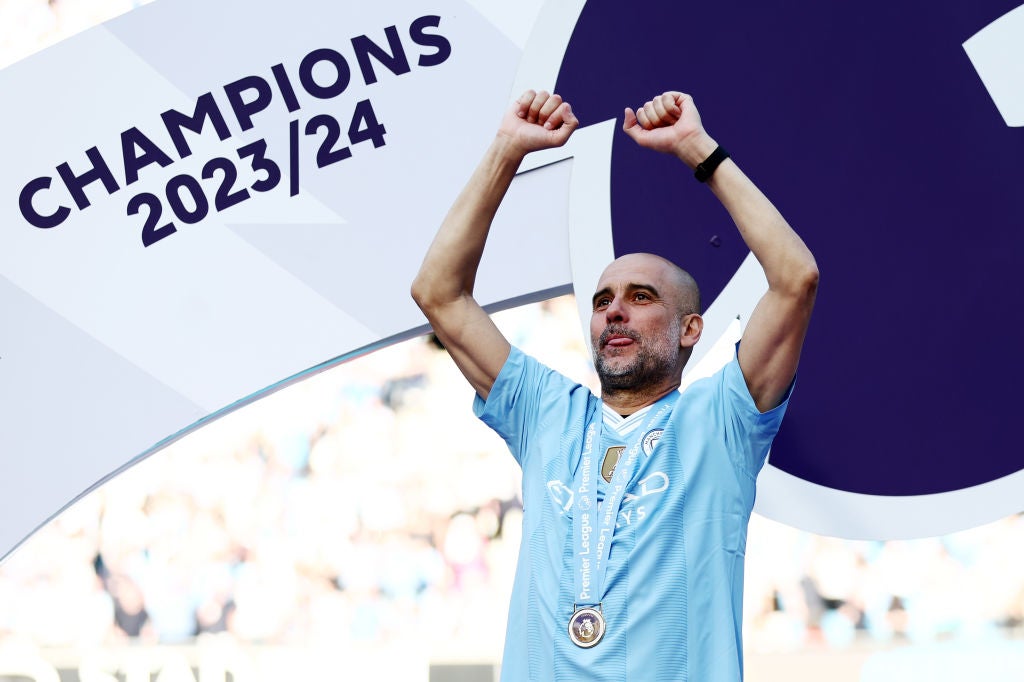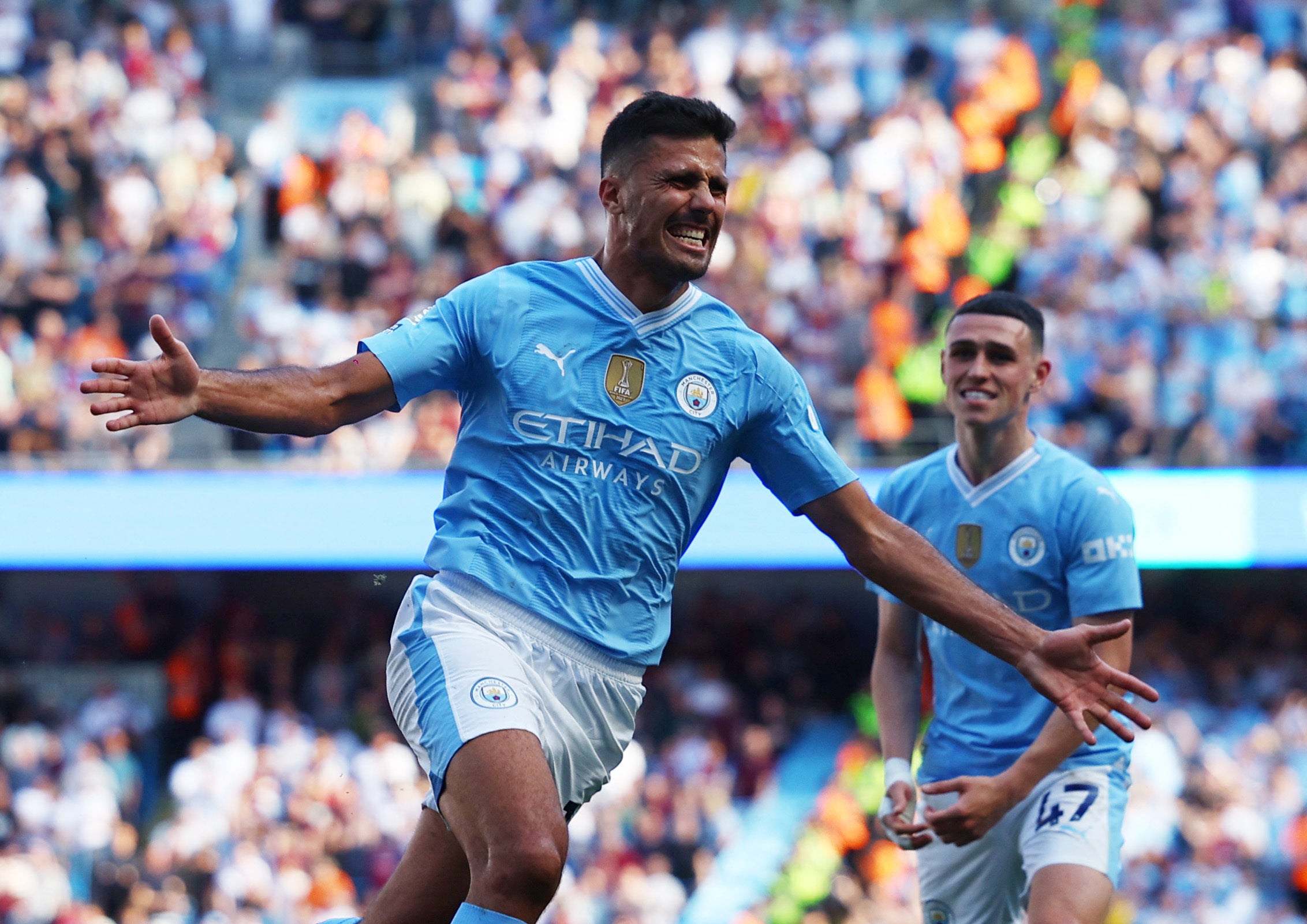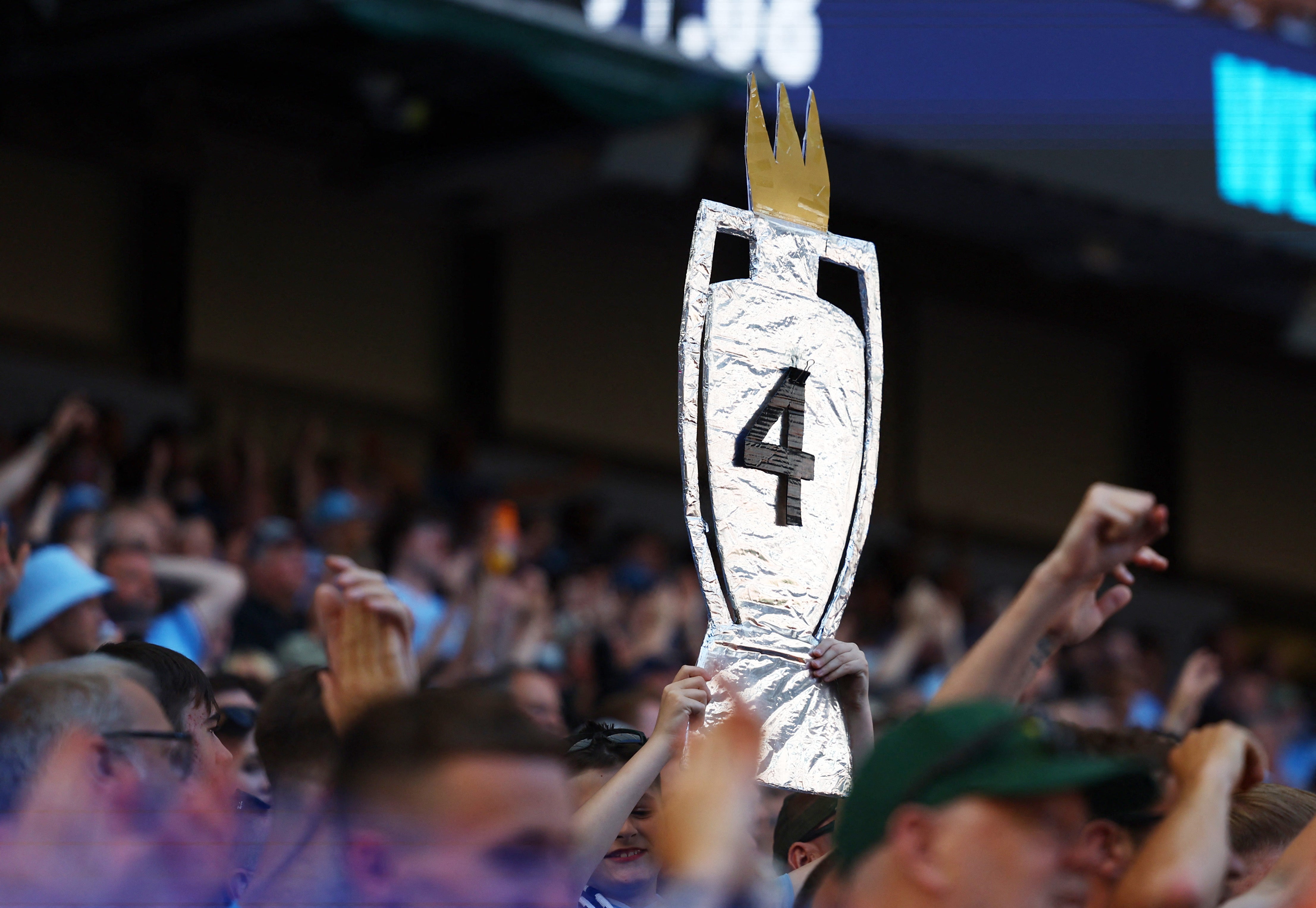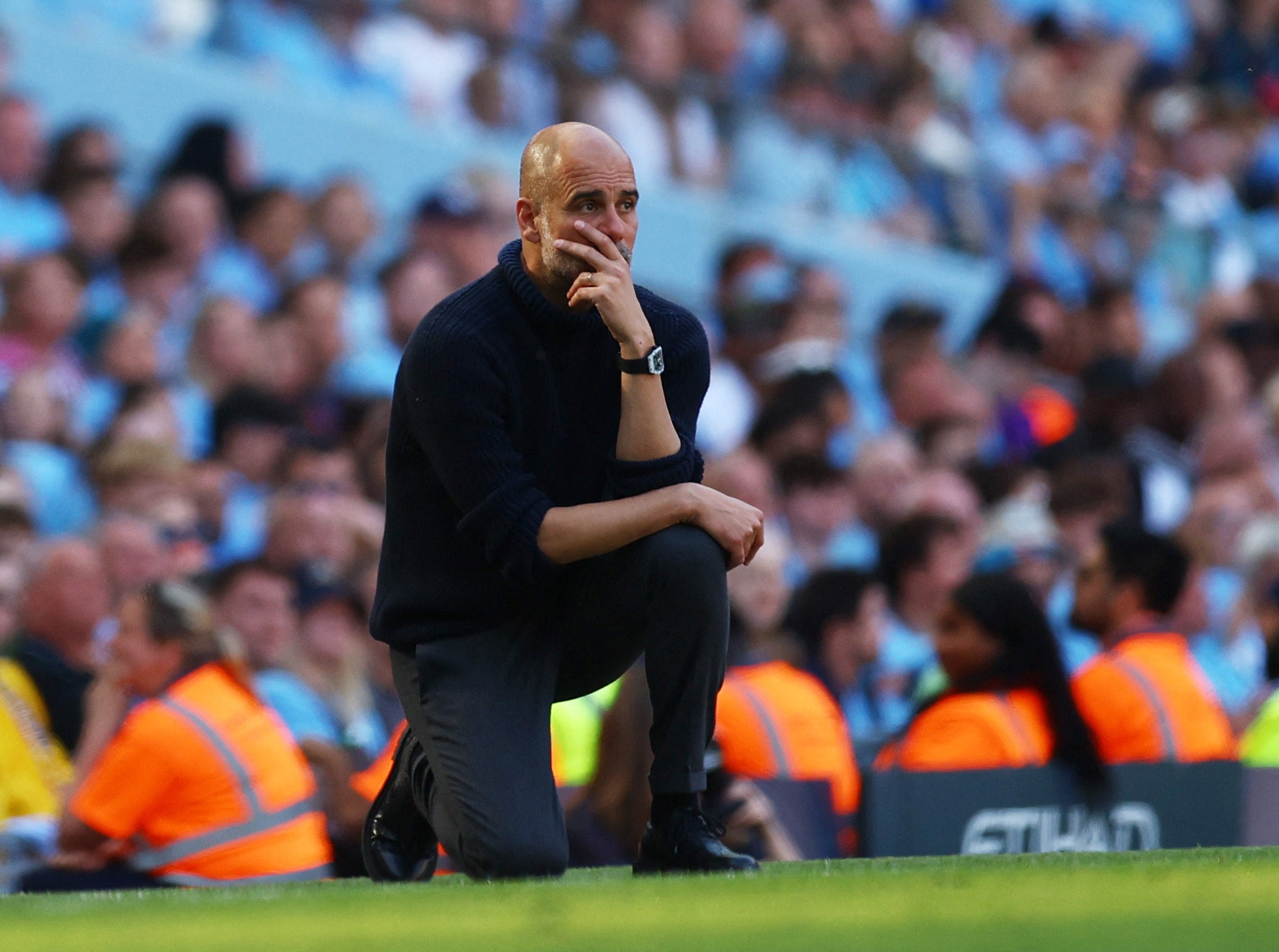Manchester City are the best – but a cloud hangs over Pep Guardiola’s era of dominance
There is no doubting the quality of Pep Guardiola’s champions, but an ongoing investigation into alleged financial breaches weighs over the historic achievement of four league titles in a row, writes Miguel Delaney


Your support helps us to tell the story
From reproductive rights to climate change to Big Tech, The Independent is on the ground when the story is developing. Whether it's investigating the financials of Elon Musk's pro-Trump PAC or producing our latest documentary, 'The A Word', which shines a light on the American women fighting for reproductive rights, we know how important it is to parse out the facts from the messaging.
At such a critical moment in US history, we need reporters on the ground. Your donation allows us to keep sending journalists to speak to both sides of the story.
The Independent is trusted by Americans across the entire political spectrum. And unlike many other quality news outlets, we choose not to lock Americans out of our reporting and analysis with paywalls. We believe quality journalism should be available to everyone, paid for by those who can afford it.
Your support makes all the difference.On a day when any tension was largely illusory, there was considerable symbolism. Arsenal lifted themselves to the 89 points that were required last season, only for Manchester City to go that bit further. They easily beat West Ham United to make it 91 points, illustrating how they always raise the bar.
Many point to this as a sign of the Premier League’s supposed competitiveness, but it really just shows how difficult it is to even keep pace with the apparently perpetual champions. City force teams to go the distance only to then go that bit further themselves. That comes from a combination of maybe the greatest manager of all time overseeing a squad and infrastructure as he idealises it, to now go further than anyone has before.
City have become the first team in English history to win four successive league titles and the first with as many as six in seven years. That’s all through returns of points (average 91.1), wins (average 29) and trophies (50 per cent of those available) that are superior to any previous club over a spell so long. It is an unprecedented level of domination, now akin to what has recently been seen in Ligue 1 or the Bundesliga.
There is of course, another number hanging over that, which played into a more potent piece of symbolism on the day. Premier League chief executive Richard Masters was not at Manchester City for their win, and that ensured there were no comments about the competition’s most senior figure again handing another Premier League title trophy to the club it has been investigating for so long.
Many people around the champions would say it’s churlish to bring this up at the moment that they win the title. It’s really never more relevant, especially given the wider context, and the necessary discussion about what any title win means. The 115 alleged breaches of Financial Fair Play (FFP) rules will weigh over everything until it’s resolved.
It does remain remarkable that this case still hasn’t been settled, a fact that’s arguably more sensational than any of Pep Guardiola’s brilliant football. It was as long ago as 2021 that the most senior judge in the UK, Lord Justice Males, said: “This is an investigation which commenced in December 2018. It is surprising and a matter of legitimate public concern that so little progress has been made after two and a half years during which, it may be noted, the club has twice been crowned Premier League champions.”

That has now become five times.
The truth is that it is forming a growing problem for the Premier League, especially as regards its image. City stress their innocence.
In more simple terms, it is difficult to sell the idea of “the most competitive league in the world” when the same team wins all the time and do it with such a level of concentrated superiority. They are so difficult to beat in individual games, let alone a title race. You only have to look at the procession to this title which basically removed any pressure or tension.
Even the final day was really settled before the 77th second, obliterating even the illusion of tension. Then again, very few people seriously believed in that illusion.
As soon as the “run-in” became real with Arsenal’s 0-0 draw at City, Guardiola’s side went and won nine successive games. That’s just under a quarter of the season, and four of those were four-goal wins. It’s even striking to think this was widely considered “lesser” than their treble season and yet they have beaten it by two points. That was also without Ilkay Gundogan, while Kevin De Bruyne appeared in less than half the league matches. The £53m Matheus Nunes was not exactly needed. The £77.5m Josko Gvardiol eventually became another cog that fitted in seamlessly.
Much of that is testament to Guardiola’s system. That has also produced football of highest quality, and there is little doubt this is the Premier League’s best ever team on just those terms.

It’s just that technically and aesthetically perfect football isn’t always the most engaging to watch after a while. The game is really driven by emotion, and emotion is fostered by tension.
Guardiola’s great ability has been in largely removing such tension from games. They strangle teams. That in turn suppresses wider interest.
City fans would say they don’t care about that, but it could have long-term repercussions for the Premier League and, by extension, them. It’s difficult to be as invested if the default expectation is just that one team will win, and it removes more of the reverence for every win. This latest historical landmark, after all, isn't exactly talked about in the way the 100-point season was.
That growing issue is compounded by the charges remaining unresolved. Frustration in football only grows.
Social media shouldn’t really be a guide for anything but it says a lot that every mention of City is now met with widespread mention of the charges. That has similarly crossed over to the stands, and is mentioned all of the time in Premier League boardrooms.
It is certainly an issue that provokes much more emotion than many of City’s sterile if still beautiful victories.
Put bluntly, a lot of the wider game do not trust the Premier League’s champions.
Again, City stress their innocence, and it should be acknowledged that nobody has an idea how this case will actually go – let alone when it will actually be concluded.
That very uncertainty, however, leaves lingering doubt.

There is something larger in all of this, however, that has ironically been particularly overlooked as discussion about the alleged breaches increases.
No matter how that case actually goes, it remains a fact that City is a state project, being used for political purposes. Those at the club will similarly point to how Sheikh Mansour bought City in a personal capacity but Abu Dhabi law doesn’t work that way, especially for senior royals in an absolute monarchy. You only have to look at how the entire club is surrounded by Abu Dhabi imagery, while being led by one of the UAE’s most influential political figures in Khaldoon al Mubarak.
Is a state project like this really what football is for? Is it really what such a great football club is for? Should the Premier League title race really just be a stage for this?
The competition is now seeing the full consequences from that fateful period in the mid-2000s when ownership was open to almost anybody.
This is the modern history of football, after all. Around that period, a series of autocratic states saw the immense social and commercial value of the sport and incorporated that into national projects. Clubs became an obvious target, as senior state figures realised the benefit of building these huge international projects that can attract fans from everywhere in the world’s most popular sport. City fans have started to see some of the negatives of this, given this season’s controversies about ticket price rises. That is something influenced by the capitalist approach that also sought to appropriate football in this period. The takeovers of the two Manchester clubs, with the Glazers in 2005 and Mansour in 2008, almost serve as twin poles that set the path for modern football. It’s a wonder how the era of Masters’s predecessor, Richard Scudamore, will be looked upon from that perspective in the future.
It looks rife with issues right now.
City were able to benefit from enough mega-investment before the introduction of FFP, to go to a level that began to set the perfect club for Guardiola. This was before the club came to a “settlement” with Uefa from an FFP investigation, where City accepted a conditional £49m fine, even though provisions for settlements weren’t actually in the regulations.
That in turn preceded immense expenditure on transfers, wages and wider infrastructure that has fostered the most lavishly funded football project in history. That’s why it’s so hard to keep up with. It is state-scale thinking, so it inevitably produced an entirely different scale of performance. City have essentially given Guardiola the most idealised settings any manager has ever had, in a way no other club can really replicate.
None of this is of course to doubt the quality of the players or the manager. They are there because they’re the best. Guardiola wasn’t some separate element who lifted this club up, though. He was instead the planned culmination of an era.
Little wonder they’ve done four in a row, and six in seven, or that there has been only the illusion of drama.
The wonder remains how it will look by the time these cases are resolved.
For now, the issue for the Premier League is that none of it is being looked upon in the way league titles should be.



Join our commenting forum
Join thought-provoking conversations, follow other Independent readers and see their replies
Comments